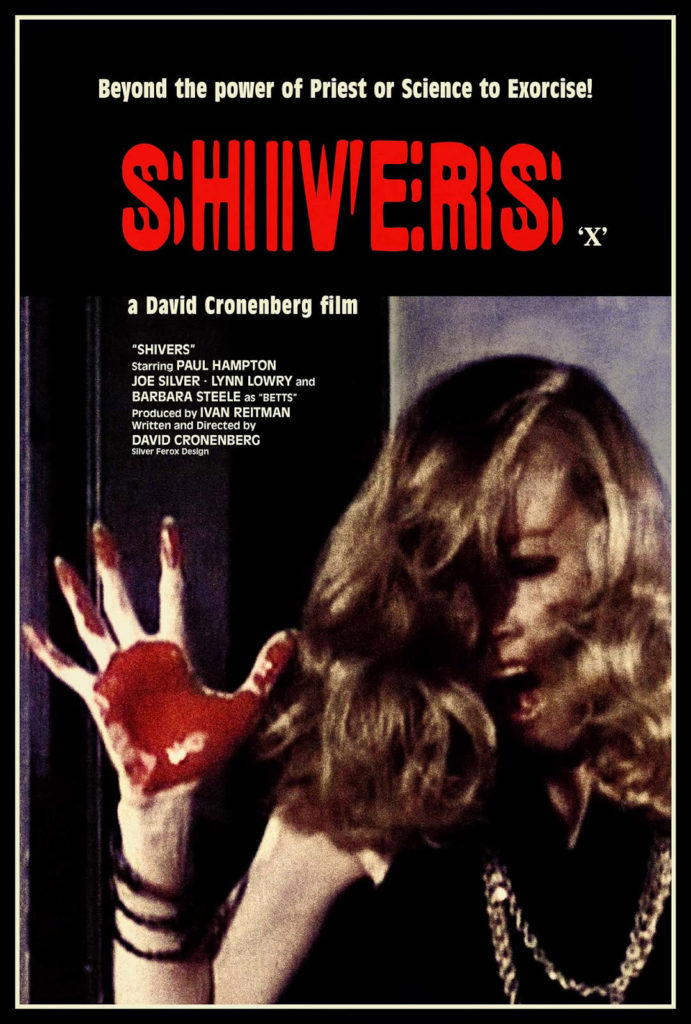 Has David Cronenberg ever made a movie that wasn’t about sex? On some level, probably not. There’s also nothing wrong with that, despite the prudish direction the moral majority has taken the United States in the last 35 years or so. Good thing for us that Cronenberg is a Canadian, right?
Has David Cronenberg ever made a movie that wasn’t about sex? On some level, probably not. There’s also nothing wrong with that, despite the prudish direction the moral majority has taken the United States in the last 35 years or so. Good thing for us that Cronenberg is a Canadian, right?
Shivers, from 1975, is Cronenberg’s first feature film, and it is all about sex. It’s not a fetish exploration like his later film, Crash, but sex is a central theme. In Shivers, a well-meaning but certifiably insane doctor named Hobbes (Fred Doederlein) has infected a resident of a new residential tower in Montreal with a parasite. The mad doctor told his financial backers and research partners that he was developing a new method to regrow organs, when in fact his true purpose was to return man to an animalistic state, a state where life would be one endless orgy. But, he screwed up, and the film opens with him trying to destroy the teenager whom he infected with the parasite. In the opening scenes, we see the doctor kill the girl and then himself, in a brutal but well done little introduction to the film that juxtaposes the modern living aspects of the apartment building with the brutal horror hidden within its walls. Even in his first film, Cronenberg starts off by showing he understands pace and storytelling.
He also understands style. One of the pleasures of a Cronenberg film from this era is that he was adept at capturing the design and architectural aesthetic of the 1970s. No scene takes place in an old building or location. Glass and concrete are the order of the day — his palette an orange, brown, and deep red — his city a Brasilia, still new enough to hide its blemishes. It’s also a stark reminder that, once upon a time, it was acceptable to build an apartment tower, even for the middle class, that was drab and prison-like. Would it have killed anyone back then to build a nice looking lobby? Or a hallway that doesn’t look like it leads to a morgue?
Hobbes would have succeeded in destroying the parasite, but it turns out his test subject was a little promiscuous, spreading the parasite among the male population of the building. One of her paramours is suffering quite a bit with his infection, eventually vomiting forth bloody slug monsters that crawl through the building and turn anyone they encounter into horny disease vectors. It’s a neat, and a gross, idea.
All that stands between the unaffected residents and the crazies in the building is Doctor St. Luc (Paul Hampton), the building’s resident general practitioner. But, time is running out. It becomes clear before the movie has gone through half its runtime that the building is descending into chaos. The infected are on the prowl, looking to use any depravity that comes to mind to get the parasites into new hosts. It only remains to be seen if the infection can be stopped at all.
Leave it to Cronenberg to avoid something that, by 1975, was already a familiar trope in horror flicks — zombies — yet use it as the basis for his own ideas. A zombie flick in an isolated apartment block is easy. It writes itself. A mind-altering infection that spreads through sex, and is powerful enough to take down civilization...that bar is a little higher.
The only things that fail Cronenberg in this film are the quality of the performances. The entire film feels as if it was culled from early takes, or that the cast had little rehearsal time. Lines are rushed, off-cadence (as if the actor or actress saying them is consciously trying to recall them), and sometimes hard to understand. This can’t be laid completely at the foot of the cast. Perhaps there just wasn’t enough money in the miniscule budget to get enough takes, but it’s a shame that in an otherwise good movie, the struggles of the cast are so noticeable.
But, this was a very profitable movie for the Canadian film industry at the time, and that success was not a fluke. Shivers was an early showcase of what film buffs could expect from newcomer David Cronenberg. This was a good watch.
